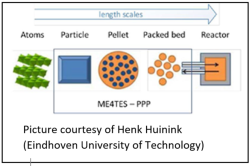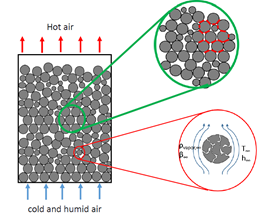project information
Full title: | Multi-scale modelling and Experimental validation of Thermochemical Energy Storage materials (Particle – Pellet – Packed bed) |
Acronym | ME4TES – PPP |
Funding/Programme | TKI URBAN ENERGY |
Duration | 2018-2020 |
Partners | TNO, PCM Technology, De Beijer RTB B.V., FPsim |
project description


There is a growing need for flexibility for the use of local and/or sustainable energy sources, which is caused by the natural fluctuations in the supply of these forms of energy. The combination of sustainable energy systems and compact thermal storage leads to more efficient use of sustainable energy and a reduction of the required energy from the electricity grid. Increased flexibility and matching supply and demand can be realized through the use of the heat battery. Sustainable heat is often abundantly available when the demand is low. Vice versa, the demand is high when the supply is generally low. Especially the use of thermochemical materials (TCMs), which is an intrinsically loss-free and compact means of thermal energy storage, can effectively couple the supply and demand. Flexibility is further increased by the possibility to charge the heat battery on the basis of (sustainable) electricity. Optimized heat and mass transfer characteristics benefit storage capacity and charge/discharge power. This allows for potentially much more frequent charging, and therefore also discharging, of the heat battery.
The aim of ME4TES is to understand the structure-property relationships of heat and mass transfer, and provide design criteria for optimally functioning TCMs inside a component of the thermal battery. For example, a high density is in principle favorable for an equally high energy density, but at the same time negatively affects the reaction kinetics and the potential power output of the system. This is, in short, a trade off that needs to be carefully understood and optimized. ME4TES will yield a validated model that accurately describes the behavior of TCMs at various length scales, namely at the level of TCM particles, pellets and a packed bed in interaction with the heat exchanger. ME4TES will exploit hydrated salts as TCMs that have shown energy storage capabilities significantly higher than water (with relevant temperature difference). In turn, this allows the development of compact thermal energy storage solutions that fit in the existing built environment in which available space is clearly limited.
